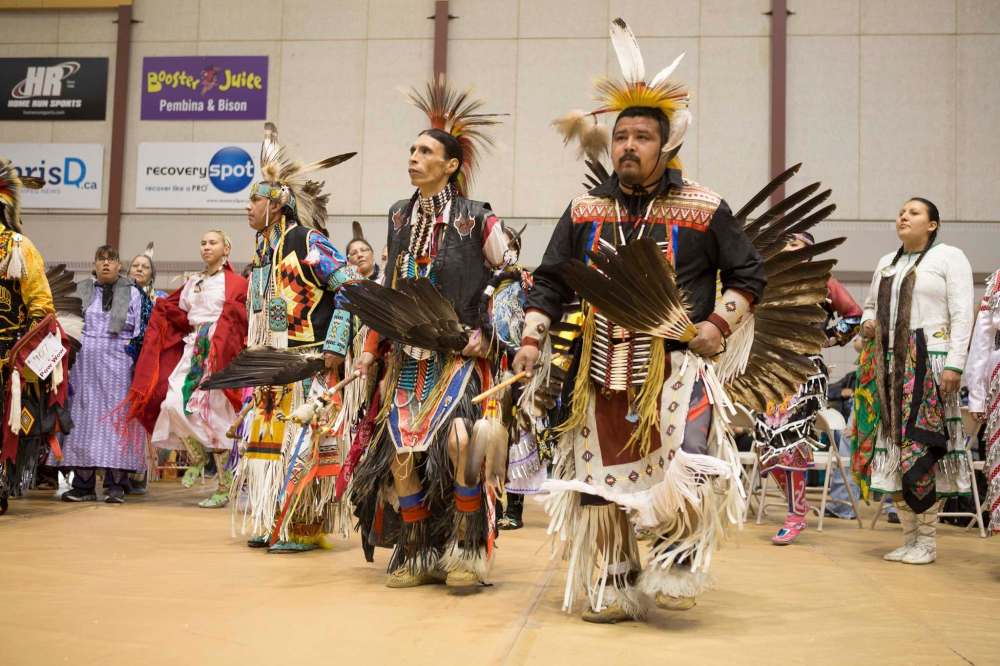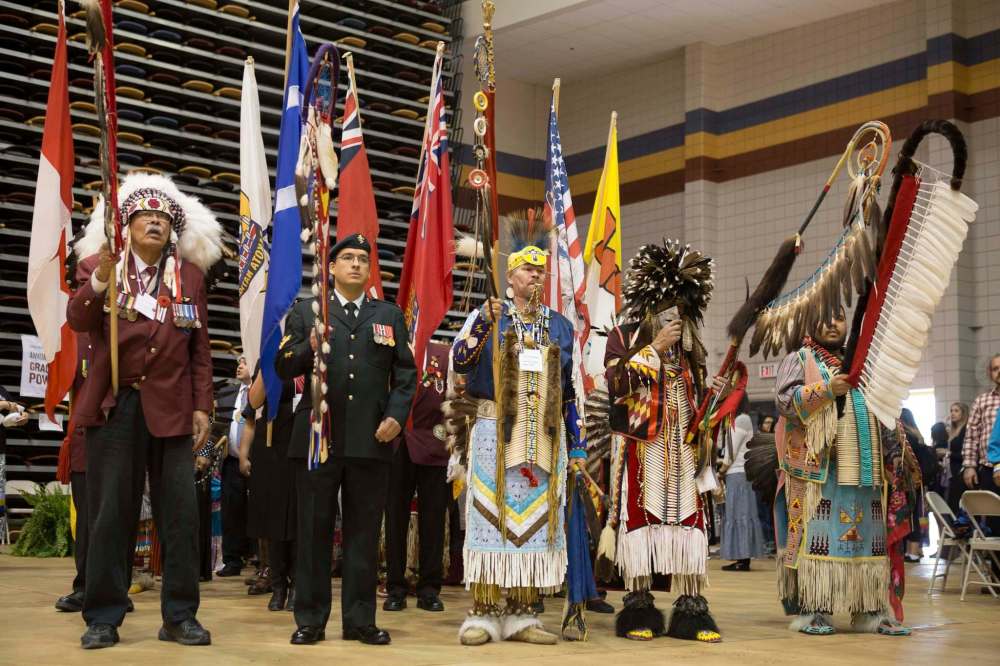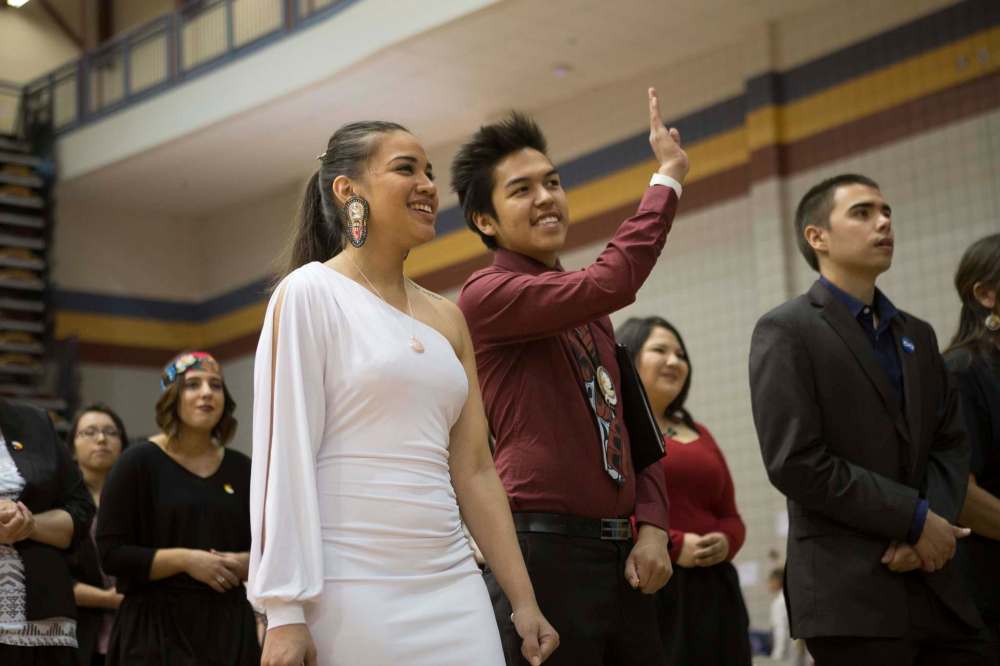Rising stars, shining bright
More indigenous students graduating from Manitoba post-secondary institutions
Advertisement
Read this article for free:
or
Already have an account? Log in here »
To continue reading, please subscribe:
Monthly Digital Subscription
$0 for the first 4 weeks*
- Enjoy unlimited reading on winnipegfreepress.com
- Read the E-Edition, our digital replica newspaper
- Access News Break, our award-winning app
- Play interactive puzzles
*No charge for 4 weeks then price increases to the regular rate of $19.00 plus GST every four weeks. Offer available to new and qualified returning subscribers only. Cancel any time.
Monthly Digital Subscription
$4.75/week*
- Enjoy unlimited reading on winnipegfreepress.com
- Read the E-Edition, our digital replica newspaper
- Access News Break, our award-winning app
- Play interactive puzzles
*Billed as $19 plus GST every four weeks. Cancel any time.
To continue reading, please subscribe:
Add Free Press access to your Brandon Sun subscription for only an additional
$1 for the first 4 weeks*
*Your next subscription payment will increase by $1.00 and you will be charged $16.99 plus GST for four weeks. After four weeks, your payment will increase to $23.99 plus GST every four weeks.
Read unlimited articles for free today:
or
Already have an account? Log in here »
Hey there, time traveller!
This article was published 08/05/2017 (3103 days ago), so information in it may no longer be current.
By the time she was 26, Ashley Richard had co-founded a magazine.
Richard, the granddaughter of the late Winnipeg elder and indigenous trailblazer Mary Richard, works at an executive search firm with offices in Montreal, Winnipeg and Ottawa. This weekend she was part of a record number of indigenous graduates who were celebrated at the University of Manitoba.
Richard graduated with honours a month ago, earning a bachelor’s degree in commerce from the Asper School of Business. The magazine she co-founded with a group of friends, Red Rising, is a non-profit platform with an online site that features aboriginal writers, musicians and artists.

She always intended to get an education, she said, but barely a decade ago, her life was headed in a much different direction. She was homeless for a year in Toronto after taking off on her own at age 15.
“I ultimately ended up in a youth shelter,” Richard said, “and I met a lot of people who were a lot older than me. I couldn’t believe they were at the same stage I was. I couldn’t picture myself being 24 and still living at this shelter I was at when I’m 17. That motivated me to go back to high school. I knew I couldn’t get anywhere without an education.”
Richard credited her grandmother’s influence for pushing her forward. She returned to high school, working two jobs while earning her high school diploma.
She returned to Winnipeg in 2011, not long after her beloved grandmother died.
“My grandmother always encouraged me to go to university, so I always knew I would go to university. It’s just that the path was more challenging than I thought,” Richard said.
Her initial interest in business led her to the Asper School of Business.
“I came in touch with this program, called the Aboriginal Business Education Partners, and they helped me through my entire degree. They helped me get accepted into Asper… and the year I got accepted, I found out I won a scholarship that would pay for my entire education,” Richard said.
“That was the moment I really knew I was on the right path.”
Richard studied full-time at university and then landed a full-time job at the Treaty Relations Commission. While her hero will always be her grandmother, Richard also credits a mentorship with former commissioner James Wilson for inspiring her.
At university, Richard travelled to France on an exchange trip and was featured in a Maclean’s magazine profile.
University of Manitoba Students’ Union president Tanjit Nagra mentioned her as a rising star during a recent university news conference.
While Richard’s story stands out, her kind of tenacity and energy has emerged as a common theme for many indigenous students.
The 28th annual Traditional Graduation Powwow celebrated 430 indigenous grads at the Fort Garry campus on Saturday. Last spring, 358 graduated; a year earlier it was 390.

“What we generally saw for statistics before that was about 200 to 250 graduates per year, but three years ago it was a really sharp increase,” said Christine Cyr, director of the U of M’s Aboriginal Student Centre. “This year is quite a jump, and we’ve seen a consistent increase in the number of students every year.
“This is not an exception. I think we’re seeing a trend,” Cyr said.
Cyr said there’s more interest in university from prospective indigenous students, more programs and services at universities to encourage recruitment and more donors earmarking their gifts for cultural contributions.
Red River College’s Notre Dame campus was packed Friday for another grad powwow. Some 16 per cent of Red River’s 22,000-member student body is indigenous. The spring grad powwow drew 120 graduates.
“That’s not all of the indigenous students who are graduating, but it is the largest number of indigenous students who have registered for this powwow,” Red River spokesman Conor Lloyd said.
The interest is a mark of cultural pride, he added.
“More and more students are signing up to celebrate their indigenous culture and their indigenous accomplishments, and they’re wanting to come and celebrate their culture,” Lloyd said.
Last year, the University of Winnipeg was among the first post-secondary institutions in Canada to offer a course on indigenous studies mandatory for all students. It boasts a growing number of indigenous students.
Some 12 per cent of U of W first-year undergraduates self-identify as indigenous.
Stacks of paperwork document past and current government and university initiatives, all of which have been designed specifically to support indigenous enrolment at the city’s post-secondary institutions.
One such list on the University of Manitoba website shows 22 programs.
“The University of Manitoba has made some recent real and tangible commitments to supporting Indigenous academics and scholarship since the strike in the fall,” noted Niigaan Sinclair, associate professor and acting head of the Native Studies Department.
The university recently appointed six new indigenous faculty members, he said.

“More is needed in areas of hiring professors and supporting crucial programs in indigenous languages and scholarship, but these are encouraging trends,” Sinclair said.
That said, it would be a mistake to make a direct link between programs and grad rates. Teasing out a cause-and-effect relationship like a math formula isn’t the right approach, academics insist.
“I wouldn’t venture to reduce the rise in graduation rates to any particular initiative. There’s a variety of things going on,” said Frank Deer, the director of indigenous initiatives and assistant professor at the U of M.
It’s true the University of Manitoba has engaged in program development during the last few years that explore different disciplines, with programs across campus, Deer said.
For instance, among the graduates who were celebrated on the weekend, there was a record number of grads from the engineering program.
“There were eight — and that’s a lot,” Deer said.
There are more indigenous students studying medicine and the sciences. Faculties such as business, nursing and social work are aiming to recruit indigenous students.
“This is the thing that makes it difficult to point to any government initiative or whatever. It takes years to have those sort of results from any particular initiative,” Deer said.
“You have a developing legacy and a few years down the line, you have results. We’re starting to see the results now.”
alexandra.paul@freepress.mb.ca

